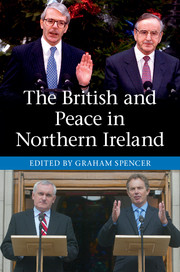Book contents
- Frontmatter
- Dedication
- Contents
- Notes on contributors
- Acknowledgements
- Brief chronology of the peace process
- Abbreviations
- Key documents
- Introduction
- 1 The terrain of discourse
- 2 The Anglo-Irish Agreement: an interview with Sir David Goodall and Lord Armstrong of Ilminster
- 3 The constitutional issue in Irish politics
- 4 Negotiations and positions: an interview with Sir John Chilcot
- 5 Resolving intercommunal conflict: some enabling factors
- 6 Tactics, strategy and space
- 7 The Joint Declaration and memory
- 8 Movement and transition in 1997: Major to Blair
- 9 The challenge of symmetry in dialogue: an interview with Sir Joseph Pilling
- 10 Why was the Good Friday Agreement so hard to implement?: lessons from ‘Groundhog Day’, 1998–2002
- 11 Text and context: an interview with William Fittall
- 12 The nature of dialogue: an interview with Sir Jonathan Phillips
- 13 Managing the tensions of difference: an interview with Jonathan Powell
- Conclusion
- Index
3 - The constitutional issue in Irish politics
Published online by Cambridge University Press: 05 March 2015
- Frontmatter
- Dedication
- Contents
- Notes on contributors
- Acknowledgements
- Brief chronology of the peace process
- Abbreviations
- Key documents
- Introduction
- 1 The terrain of discourse
- 2 The Anglo-Irish Agreement: an interview with Sir David Goodall and Lord Armstrong of Ilminster
- 3 The constitutional issue in Irish politics
- 4 Negotiations and positions: an interview with Sir John Chilcot
- 5 Resolving intercommunal conflict: some enabling factors
- 6 Tactics, strategy and space
- 7 The Joint Declaration and memory
- 8 Movement and transition in 1997: Major to Blair
- 9 The challenge of symmetry in dialogue: an interview with Sir Joseph Pilling
- 10 Why was the Good Friday Agreement so hard to implement?: lessons from ‘Groundhog Day’, 1998–2002
- 11 Text and context: an interview with William Fittall
- 12 The nature of dialogue: an interview with Sir Jonathan Phillips
- 13 Managing the tensions of difference: an interview with Jonathan Powell
- Conclusion
- Index
Summary
As I write (January 2014), the talks between the parties on the Northern Ireland Executive, chaired by the former US diplomat Richard Haass, have petered out without reaching any conclusion. Among the issues on the agenda are the extent to which various parades should be subject to a code of conduct intended to reduce the risk that they might inflame intercommunal tension; and the circumstances in which the Union flag may be flown over the City Hall in Belfast. On both issues it seems that unionist negotiators have been unable to secure an outcome that would satisfy the loyalist community. Only last year there was extensive rioting in parts of Belfast in protest at the decision by Belfast City Council to limit the flying of the Union flag over City Hall to those ceremonial days on which it is typically flown on public buildings throughout the rest of the UK. Those protests may appear to be about something either arcane or purely symbolic, but in reality they reflect a deep underlying anxiety within the loyalist community about the security of their position as citizens of the UK.
That anxiety, in turn, is one element of a broader feeling among many loyalists that the unionist community ‘lost out’ all along the line in the negotiation of the Belfast Agreement (BA), that republicans conversely gained, and that the overall outcome must therefore have weakened the prospects for Northern Ireland remaining a part of the UK – which is, after all, the defining objective of the whole unionist community. For as long as this analysis remains unchallenged it will continue to be difficult to secure what might otherwise appear to be a sensible accommodation between the two parts of the community in Northern Ireland on difficult issues such as the management of parades and the display of flags and emblems. This brief analysis will examine the constitutional issue in Northern Ireland and Irish politics over the period since partition, and show how it was eventually resolved as part of the ‘talks process’. In doing so, it will demonstrate that – in respect of this crucial element of the BA – it was actually the unionist view that largely prevailed and the republican position that had to shift furthest. We begin with an analysis of different perspectives on the constitutional issue and how they evolved over the period 1920–80.
- Type
- Chapter
- Information
- The British and Peace in Northern IrelandThe Process and Practice of Reaching Agreement, pp. 55 - 78Publisher: Cambridge University PressPrint publication year: 2015



